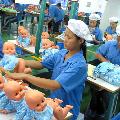
There are important lessons from women’s struggle in Chinese history that should be studied again.
International Women’s Day was celebrated for the first time in China in 1924. By then, growing workers’ and women’s movements were already developing. The Hunan Women’s League was formed in 1921. By the end of that year they had pushed through provisions on women’s suffrage and personal freedom in Hunan’s constitution. The Association for Women’s Rights in Zhejiang province issued an appeal for women to join the revolution to overthrow the warlords and introduce democracy. In Shanghai, 20,000 workers in the silk spinning industry went on strike in 1923 demanding a 10-hour day and wage increases. Chen Pi-lan, who became a Trotskyist, was one of the leaders of the Communist Party Women’s League in Shanghai.
According to ’Women in the Chinese Revolution’ by Kate Curtin, Pi-lan explained that “when the CCP formed peasant associations, women’s issues immediately came up. Some women went to the peasant unions and accused their husbands of oppressing them. Others accused their mothers-in-law of the same thing. In some parts of the countryside women’s associations were organised in order to sort out relationships within families. For the first time there were divorces initiated by women in the countryside”. When hundreds of thousands of workers fought battles against the police and army “the members of the Shanghai Women’s League stood to the fore waving their flags, and often they showed more courage than the men.” In the 1920s, the Communist Party gave its unqualified support to the women’s movement and stood at the head of the National Women’s Association, which in 1925-1927 had 300,000 members.
After the 1949 revolution in China, prostitution and infanticide was banned. A new marriage law gave women the right to property, inheritance rights and free choice regarding marriage, divorce and the care of children. The government stated that with the land reform 60 million women achieved equality with men in terms of land holdings in central and eastern China. But this movement was uneven. The Communist Party had long been led not by genuine Marxists but by an undemocratic Maoist bureaucracy, which wanted unquestioned control and saw a militant women’s movement as a threat. In 1952 they announced that women’s liberation had been achieved and dropped demands for independent struggle by women (Curtin) – a line that was then modified several times depending on what suited the regime’s interests. Maoism did not tolerate real workers’ democracy from below and for this women paid a high price. In Russia too the revolution had been betrayed and already by the early 1930s a large part of the reforms for women were withdrawn by Stalin’s bureaucratic dictatorship.
In China, the state exercises control over women’s bodies, even to the extent of forcing women to have abortions. While the law forbids this practice, it happens. Local authorities, in enforcing birth control policies carry out forced abortions even during the late stages of pregnancy. Under the Chinese government’s ‘one-child policy’, women are not allowed ‘unauthorised’ children.
According to the World Health Organisation, China is the only country in the world where more women than men commit suicide. Every year a staggering 1.5 million women try to take their own lives and 150,000 succeed. This is especially the case in the countryside where women face grinding poverty, the highest school drop-out rates, and the burden of caring for elderly relatives. The woman belonging to the man; this has been the pattern of women’s oppression for ages around the world.
Rapid industrialisation over many years, with China becoming the world’s factory, has obviously transformed living conditions for many women. Despite miserable conditions, migrating for work and being able to support themselves, and sometimes even becoming the family’s main breadwinner, has inevitably shaken up the older patriarchal structures. The most important change in becoming a wage labourer is leaving the isolation of the home and working under similar conditions to thousands of others. In this lies the possibility to organise and act collectively.
In November 2009, 3,000 women workers in Hainan province employed by the German lingerie giant Triumph went on strike. They demanded that the bosses’ withdrawal of a 700 yuan (US$ 102) bonus must be stopped. Wages in the factory were between 500 to 600 yuan per month. This multinational company closed two factories in the Philippines last summer in an attempt to crush the predominantly female trade union. The Chinese Triumph strikers got results, and the bonuses were paid out even though the women’s demand for wages to match the legal minimum was not met. In Shanghai, one year earlier, there was another example of the growing power of women workers, with a strike by 1,000 mostly young women at an electronics company also demanding their bonuses be paid. Although these strikes have so far been defensive in character, this is an important sign of nascent organisation.
On 18 October last year 2,000 women in Hong Kong celebrated the 10th anniversary of the IMWU, Indonesian Migrant Workers’ Union. Chinaworker.info was there. “We are workers, not slaves” was one of the slogans. The 250,000 migrant women in Hong Kong work mainly as domestic workers. One in four Indonesian migrants earn below the monthly minimum of 3,580 HK dollars ($462). Half are working 15 hours a day without a single day off per week. “We want the Hong Kong government to include us in its new minimum wage legislation. They want to exempt us, this is discrimination,” said one of them, a young woman called Muthi.
She and millions of women around the world need March 8 to be commemorated in the way its initiators intended one hundred years ago.


Be the first to comment